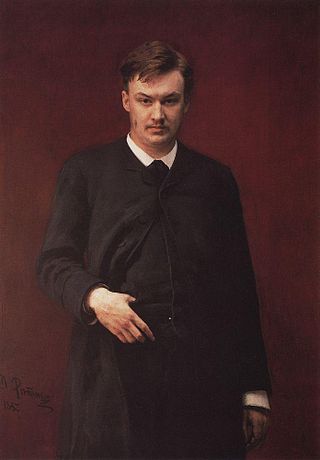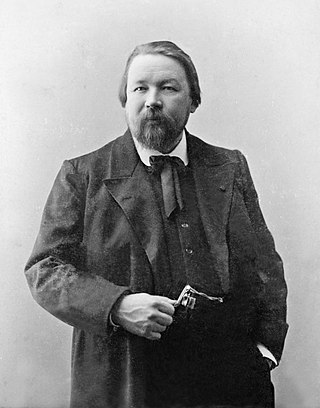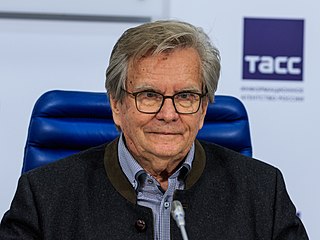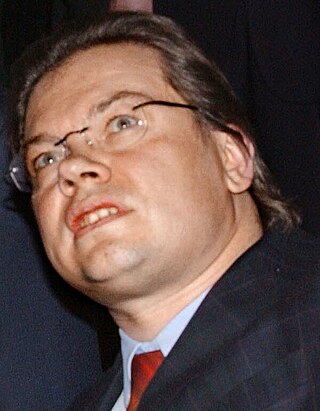Related Research Articles

Prince Igor is an opera in four acts with a prologue, written and composed by Alexander Borodin. The composer adapted the libretto from the early Russian epic The Lay of Igor's Host, which recounts the campaign of the 12th-century prince Igor Svyatoslavich against the invading Cuman ("Polovtsian") tribes in 1185. He also incorporated material drawn from two medieval Kievan chronicles. The opera was left unfinished upon the composer's death in 1887 and was edited and completed by Nikolai Rimsky-Korsakov and Alexander Glazunov. It was first performed in St. Petersburg, Russia, in 1890.

Nikolai Andreyevich Rimsky-Korsakov was a Russian composer, a member of the group of composers known as The Five. He was a master of orchestration. His best-known orchestral compositions—Capriccio Espagnol, the Russian Easter Festival Overture, and the symphonic suite Scheherazade—are staples of the classical music repertoire, along with suites and excerpts from some of his fifteen operas. Scheherazade is an example of his frequent use of fairy-tale and folk subjects.

Alexander Konstantinovich Glazunov was a Russian composer, music teacher, and conductor of the late Russian Romantic period. He was director of the Saint Petersburg Conservatory between 1905 and 1928 and was instrumental in the reorganization of the institute into the Petrograd Conservatory, then the Leningrad Conservatory, following the Bolshevik Revolution. He continued as head of the Conservatory until 1930, though he had left the Soviet Union in 1928 and did not return. The best-known student under his tenure during the early Soviet years was Dmitri Shostakovich.

Mikhail Mikhailovich Ippolitov-Ivanov was a Russian and Soviet composer, conductor and teacher. His music ranged from the late-Romantic era into the 20th century era.

The Golden Cockerel is an opera in three acts, with a short prologue and an even shorter epilogue, composed by Nikolai Rimsky-Korsakov, his last complete opera, before his death in 1908. Its libretto written by Vladimir Belsky, is derived from Alexander Pushkin's 1834 poem, The Tale of the Golden Cockerel. The opera was completed in 1907, and premiered in 1909, in Moscow, after the composer's death. Apart from Russia, it has often been performed in French, as Le coq d'or.

Sergey Ivanovich Taneyev was a Russian composer, pianist, teacher of composition, music theorist and author.

The Snow Maiden: A Spring Fairy Tale is an opera in four acts with a prologue by Nikolai Rimsky-Korsakov, composed during 1880–1881. The Russian libretto, by the composer, is based on the like-named play by Alexander Ostrovsky.

The Stone Guest is an opera in three acts by Alexander Dargomyzhsky from a libretto taken almost verbatim from Alexander Pushkin's 1830 play of the same name which had been written in blank verse and which forms part of his collection Little Tragedies.

Mozart and Salieri is a one-act opera in two scenes by Nikolai Rimsky-Korsakov, written in 1897 to a Russian libretto taken almost verbatim from Alexander Pushkin's 1830 verse drama of the same name.

The Legend of the Invisible City of Kitezh and the Maiden Fevroniya is an opera in four acts by Nikolai Rimsky-Korsakov. The libretto was written by Vladimir Belsky, and is based on a combination of two Russian legends: those of Saint Fevroniya of Murom and of the city of Kitezh, which became invisible when attacked by the Tatars. The opera was completed in 1905, and the premiere performance took place at the Mariinsky Theatre in St. Petersburg, on February 7, 1907, the last in Rimsky-Korsakov's lifetime.

The Tsar's Bride is an opera in four acts by Nikolai Rimsky-Korsakov, the composer's tenth opera. The libretto, by Ilia Tyumenev, is based on the drama of the same name by Lev Mey. Mey's play was first suggested to the composer as an opera subject in 1868 by Mily Balakirev. However, the opera was not composed until thirty years later, in 1898. The first performance of the opera took place in 1899 at the Moscow theater of the Private Opera of Savva Mamontov.

Vladimir Ivanovich Fedoseyev is a Soviet and Russian conductor, accordionist, teacher. People's Artist of the USSR (1980). Laureate of the USSR State Prize (1989) and the Glinka State Prize of the RSFSR (1970). Full Commander of the Order "For Merit to the Fatherland". Artistic director and chief conductor of the Tchaikovsky Symphony Orchestra since 1974.
Kashchey the Deathless is a one-act opera in three scenes by Nikolai Rimsky-Korsakov. The libretto was written by the composer, and is based on a Russian fairy tale about Koschei the Deathless, an evil, ugly old wizard, who menaced principally young women. Rimsky-Korsakov perceived it as 'an autumn tale' that is juxtaposed to his previous 'spring tale', The Snow Maiden. A similar fairy tale was also used by Igor Stravinsky and Michel Fokine to create their iconic ballet, The Firebird.

Volodymyr Markovych Kozhukhar was a Soviet and Ukrainian conductor and academic teacher who focused on opera. Most notably, he conducted and taught in Kyiv and Moscow, among other places.

The Maid of Pskov, also known as Ivan the Terrible, is an 1872 opera originally in three acts by Nikolai Rimsky-Korsakov. The libretto is by the composer, after the play by Lev Mei.
Michail Vladimirovich Jurowski was a Russian conductor who worked internationally, based in Germany for most of his career. He was particularly interested in the works of Dmitri Shostakovich, in concerts and recordings.
Marius Stravinsky is a Kazakh-British conductor and violinist.

Alexander Alexandrovich Vedernikov was a Russian conductor. He held major posts with the Bolshoi Theatre the Odense Symphony Orchestra, the Royal Danish Opera, and the Mikhailovsky Theatre.
Dmitri Jurowski is a German conductor and the grandson of composer Vladimir Michailovich Jurowski.
Kirill Tikhonov (1921–1998) was a Russian conductor and a recipient of the People's Artist of Russia award.
References
- 1 2 3 "Vladimir Ponkin". Helikon Opera. Retrieved January 7, 2014.
- 1 2 "Vladimir Ponkin" . Retrieved January 7, 2014.